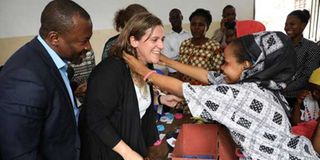USAID impressed by HIV prevention interventions by Sauti Project

Nasra Haroun from Amka Group in Temeke dons Usaid Deputy Mission Director in Tanzania, Helen Pataki with a neckless when the later visited Jhpiego led program Sauti Project to see the implementation of project activities. Looking aside is Sauti Chief of Party Dr Albert Komba. PHOTO | CORRESPONDENT
What you need to know:
The project engages beneficiaries to be part of the project through economic activities. It mobilises girls to form economic groups through which they are trained on economic empowerment, gender and entrepreneurship skills
Dar es Salaam. The United State Agency for International Development (Usaid) has lauded Sauti Project -- a Jhpiego led program -- for the great initiative to scale up different and innovative HIV intervention which has helped to reduce vulnerability among Tanzanians.
Usaid Deputy Mission director in Tanzania, Ms Helen Pataki, made the remarks when she and her team visited Sauti project activities in Kinondoni and Temeke Districts in Dar es Salaam Region to assess the implementation of Usaid funded Sauti Project activities.
According to her, Sauti Project has done an excellent job by collaborating with Local Government and Community social organisations to identify key spots dominated by risk activities and introduce different interventions that focuses to help vulnerable groups like young girls and boys below the age of 35 to lead safe lives.
“It was very interesting to see Sauti Project personnel and beneficiaries work together with the government to reduce HIV/Aids prevalence and help people with their health status. The testimonies from the beneficiaries are so touching and we are happy there is great impact from these interventions,” she said.
She thanked the local governments for supporting the project and opening their doors for beneficiaries to use their facilities to learn new ideas and skills necessary for their survival like the Economic Empowerment for Vulnerable Adolescent Girls and Young Women (AGYW).
Detailing the intervention implemented through the project, Sauti Chief of Party, Dr Albert Komba, said the project targets all vulnerable groups including young girls who are out of schools by engaging them into services like biomedical services that includes voluntary HIV testing, family planning, screening for gender based violence, STI, counselling on usage of alcohol and drugs.
He noted such activites are conducted in different localities through community – based HIV testing and venue – based HIV testing, behaviour change communication sessions and economic empowerment groups.
“We are particularly impressed with how our project are sharing experiences and lessons learnt in terms of engaging beneficiaries to be part of the project through economic activities which is part of the DREAMS (Determined, Resilient, Empowered, Aids-free, Mentored, Safe) initiative. There, we mobilised girls to form WORTH+ groups and train them on economic empowerment, gender and entrepreneurship skills and how to protect themselves against high risk behaviours so that they understand their role and managed to accomplish their goals through identifying potential areas for income generating activities and starting their own businesses,” said Dr Komba.
For his part, Kinondoni Municipal Deputy Mayor, Mr George Manyama, who was accompanied by District Medical Office Dr Festo Dugange, said Jhpiego, through Sauti Project, exemplified a real partner who has collaborated with them in fighting HIV/Aids prevalence.
“Since they started todate, they have been able to reach 13,050 vulnerable individuals in 17 wards out of 19 wards in Kinondoni District, which makes a total coverage of 90 percent of the area,” he said adding:
“I think the NGO has done a great job, we are particularly impressed when the beneficiaries specifically share their testimony and have partnered to change others by creating a free HIV/Aids generation.”




